Pen-Ultimate (Freedom of Expression) and the Racist Spectacle of #JeSuisCharlie
by Leila Gaind
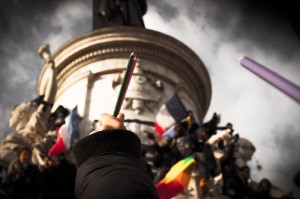 On January 7th, 2015, two brothers, Cherif and Said Kouachi, broke into the Charlie Hebdo office in Paris and murdered twelve people, including the editor-in- chief and several of the magazine’s most celebrated cartoonists and columnists. This horrific attack led to a nearly instant outpouring of grief and support for the publication, and the Internet exploded with the hashtag “JeSuisCharlie” (I am Charlie).[i] Four days after the shooting, many of the world’s most powerful leaders, including Angela Merkel, Benjamin Netanyahu, and David Cameron, congregated in Paris to take part in a march of unity, standing in bold defiance towards what President Francois Hollande as an “act of exceptional barbarism.”[ii] The massacre and the subsequent demonstrations in France, the most monumental since the end of the Second World War, commanded global attention, and the images of millions of Parisians standing in solidarity against this violent act were transmitted instantaneously throughout the media.[iii] However, while the events that unfolded were undoubtedly tragic and horrific, the popular discourses that have emerged since January 7th have been reductive and have served to perpetuate a singular, limited narrative.[iv] The aim of this paper will be to investigate the “JeSuisCharlie” sentiment and its underlying roots in order to demonstrate how it has deployed the principle of free speech in a way that reinforces the growing anti-Islam attitude in France and hardens existing ‘us vs. them’ binaries.
On January 7th, 2015, two brothers, Cherif and Said Kouachi, broke into the Charlie Hebdo office in Paris and murdered twelve people, including the editor-in- chief and several of the magazine’s most celebrated cartoonists and columnists. This horrific attack led to a nearly instant outpouring of grief and support for the publication, and the Internet exploded with the hashtag “JeSuisCharlie” (I am Charlie).[i] Four days after the shooting, many of the world’s most powerful leaders, including Angela Merkel, Benjamin Netanyahu, and David Cameron, congregated in Paris to take part in a march of unity, standing in bold defiance towards what President Francois Hollande as an “act of exceptional barbarism.”[ii] The massacre and the subsequent demonstrations in France, the most monumental since the end of the Second World War, commanded global attention, and the images of millions of Parisians standing in solidarity against this violent act were transmitted instantaneously throughout the media.[iii] However, while the events that unfolded were undoubtedly tragic and horrific, the popular discourses that have emerged since January 7th have been reductive and have served to perpetuate a singular, limited narrative.[iv] The aim of this paper will be to investigate the “JeSuisCharlie” sentiment and its underlying roots in order to demonstrate how it has deployed the principle of free speech in a way that reinforces the growing anti-Islam attitude in France and hardens existing ‘us vs. them’ binaries.
As Brad Evans purports in his article The Eyes of the World, “in the age of 24- hour broadcast news, [the] luxury of reflectively contemplating is denied us,” as exemplified in the instantaneous and widespread reaction to the massacre.[v] Immediately following the violent attack, the emotionally driven and visceral hashtag “JeSuisCharlie” erupted across the Internet and was echoed by civilians and politicians alike as they gathered in the Place de la République in Paris.[vi] On the surface, this sentiment can be understood as a simple display of solidarity that allowed individuals the opportunity to express their allegiance and support for the victims while condemning the brutal attack.[vii] However, this scramble to identify oneself as Charlie quickly came to represent a staunch defense of a greater set of principles and values, the most “common currency” being the unequivocal right to freedom of speech and expression.[viii] Those who subscribed to this identification implicitly endorsed the understanding that this violent act was in its essence an attack [by Islamic extremists] on the fundamental freedom to say whatever we desire, one of the pillars of Western democracy.[ix] In the wake of the massacre, this value has become sacrilegious, and Charlie Hebdo has come to symbolize the ultimate manifestation of the principle of free speech.[x] There is an aspect of absolutism apparent in this affiliation, as those who identify as Charlie claim to be “standing against terrorism and standing up for freedom”[xi] and across the Western world, media moguls and popular personalities have been quick to identify the “urgent need for worldwide solidarity against censorship enforced by violence.”[xii]
While responses have been varied, with the usual suspects such as Rupert Murdoch tweeting baseless nonsense like: “Maybe most Moslems peaceful, but until they recognize and destroy their growing jihadist cancer they must be held accountable”[xiii] across the political spectrum endeavors to explain the attack have become dangerously polarized.[xiv] Reduced to its most crude form, the massacre has been construed by many to be a “clash of cultures”, pitting the just, rational, and free Western world against the violent, irrational, and repressive East.[xv] This argument is guilty of “[appealing to] hashtag simplicity and bumper sticker righteousness,” and fails to address the complex roots of the attack and the greater socio-political context in which it occurred.[xvi]
Those who stand in solidarity with Charlie argue vehemently that the attack on the magazine represented a wider assault on France’s liberal underpinnings of “liberté, égalité, and fraternité” (freedom, equality, and brotherhood).[xvii] They cite the goal of satire as being to “provoke a reaction, even to wound, in order to make a political point and to advance understanding,”[xviii] and argue that within the French context, Charlie Hebdo was only following in the tradition of “gouaille”, a form of obscene, anarchist satire whose goal is to penetrate all spheres of sanctity and “cut down anything that would erect itself as venerable, sacred, or powerful.”[xix] 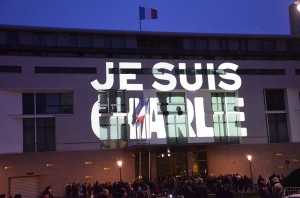 Countless news articles describe the publication as an “equal opportunity offender,” whose cartoons and images were intended to paint current events and circumstances as absurd and comedic.[xx] However, while Charlie Hebdo did poke fun at other religions and institutions of power, it gained distinct notoriety for its depictions of the prophet Muhammad, which were first produced in 2006, leading to widespread outrage throughout the Muslim world.[xxi] Within Islam it is seen as blasphemous to depict the prophet, and thus his very illustration was culturally insensitive, let alone the fact that the cartoons themselves were obscene and aggressively offensive.[xxii] While many argue that the images were intended to satirize only the extreme forms of the Muslim religion, the unwillingness to acknowledge the difference between “satire against the powerful”, and satirizing an already marginalized group in such a way that it reinforces racist stereotypes is problematic and indicative of how normalized the Islamophobic sentiment has become.[xxiii]
Countless news articles describe the publication as an “equal opportunity offender,” whose cartoons and images were intended to paint current events and circumstances as absurd and comedic.[xx] However, while Charlie Hebdo did poke fun at other religions and institutions of power, it gained distinct notoriety for its depictions of the prophet Muhammad, which were first produced in 2006, leading to widespread outrage throughout the Muslim world.[xxi] Within Islam it is seen as blasphemous to depict the prophet, and thus his very illustration was culturally insensitive, let alone the fact that the cartoons themselves were obscene and aggressively offensive.[xxii] While many argue that the images were intended to satirize only the extreme forms of the Muslim religion, the unwillingness to acknowledge the difference between “satire against the powerful”, and satirizing an already marginalized group in such a way that it reinforces racist stereotypes is problematic and indicative of how normalized the Islamophobic sentiment has become.[xxiii]
While Charlie Hebdo may not have been an intentionally racist publication, “to defend satire because it’s indiscriminate is to admit that it discriminates against the defenseless,” the most patently “defenseless” demographic in France being immigrants from Muslim countries.[xxiv] Brad Evans cites HL Mencken’s definition of “good journalism” to be works that “afflict the comfortable and comfort the afflicted,” and argues that although the cartoonists were within their rights to publish such offensive works, their position of privilege as artists and writers comes with a set of ethical responsibilities.[xxv] The images that the publication produced, not only ridiculed this already “demonized” demographic, but further emphasized existing forms of power and violence in France.[xxvi] Their choice to publish such cartoons “can hardly be called an undertaking of tolerance,” and their perpetuation of a racist stereotype demonstrates a lack of cultural sensitivity that has become normalized in France.[xxvii] The argument of whether Charlie Hebdo pierced the boundary between freedom of expression and prejudice aside, “all caricature[s] [are] not created equal,” and the response to the attack has made it clear that while the production of some images will be staunchly defended as a democratic right, others will be protested as insensitive and in some cases illegal.[xxviii] For example, in 2005 the French newspaper Le Monde was taken to court and found guilty of “racist defamation” towards Jewish and Israeli people, and in 2008 a cartoonist at Charlie Hebdo was fired for refusing to apologize for anti-Semitic remarks that he made in his column.[xxix] These cases demonstrate that instead of being absolute and sacred, the principle of free speech in France is applied unequally, depending on who is being offended. As stated by Gary Younge, “all societies draw lines, that are ill-defined, constantly shifting and continually debated, about what constitutes as acceptable standards of public discourse when it comes to cultural, racial, and religious sensitivities.”[xxx] The fight for freedom of expression may be understood as noble and right, but it is hard to overlook the double standard that pervades French society.
On another note, transcending the discussion of freedoms and rights in their purest forms, Tariq Ramadan discusses how in a pluralistic and diverse society, the principles of respect and sensibility must also be considered.[xxxi] While freedom of expression should be defended, those who are mocked and trivialized by offensive images also have the right to denounce the cartoons and argue for more responsible and dignified forms of expression.[xxxii] The view that “freedom of expression is sacrosanct” is inherently extreme, and disregards the “conditions, qualifications, [and] hedges” that must (and do) exist in any civil society.[xxxiii] Looking at the issue in polar terms, as those who defend freedom of speech and those who do not, does not further any meaningful conversation and masks many of the deeper underlying issues surrounding the attack. Moreover, the insistence on “contagious responsibility and collective guilt” on the part of the Muslim population is regressive and absurd, and belies the logic that all individuals have the right to free speech and the right to take offense.[xxxiv] Even on the surface, hypocrisy runs rampant in those claiming righteously and religiously to be Charlie.
Moreover, despite the obvious provocation that the cartoons served, the event cannot be reduced to a singular incident in which two Muslim men reacted violently to images in a French magazine. As inane as it is to universalize the extreme, violent response of the Kouachi brothers as belonging to the entire Muslim community, it is also unreasonable to deny the broader context in which these events unfolded. As stated by Brad Evans, “political violence always has a history”, and within the French context, the legacy of colonialism and the more immediate history of Western interventions in the Muslim world certainly play into this ideologically motivated act of violence.[xxxv] 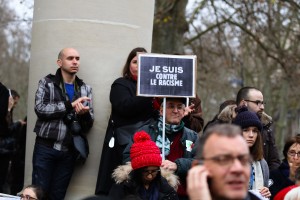 While the perpetrators of the crime themselves cannot be questioned, their experiences can be investigated through a wider lens that takes into account the rampant Islamophobia that has manifested itself in France. The roots of this current moment can be traced back to the French invasion of Algeria in 1830, akin to most colonial projects in the “odyssey of murder, expropriation, racism, exploitation and misrule” that ensued.[xxxvi] These 130 years of colonial rule only ended in 1962, following the six year long bloody Algerian war, through which Algeria gained independence, but at the expense of over one million lives.[xxxvii] However, despite this momentous moment in Algerian history, the “post-colonial” governments, still linked to their previous colonizer, became progressively corrupt, leading to widespread emigration from Algeria to France.[xxxviii] This pattern is all too familiar and mirrors the plight of many other migrant groups who have left (and are leaving) their native land in pursuit of a better, more liberating existence in the home of their former colonizers.[xxxix] However, there is widespread evidence that the integration of these immigrant groups, particularly those from North and sub- Saharan African countries, has been severely lacking, and these populations live in “another France,”[xl] one that exists in the social and economic margins of society.[xli]
While the perpetrators of the crime themselves cannot be questioned, their experiences can be investigated through a wider lens that takes into account the rampant Islamophobia that has manifested itself in France. The roots of this current moment can be traced back to the French invasion of Algeria in 1830, akin to most colonial projects in the “odyssey of murder, expropriation, racism, exploitation and misrule” that ensued.[xxxvi] These 130 years of colonial rule only ended in 1962, following the six year long bloody Algerian war, through which Algeria gained independence, but at the expense of over one million lives.[xxxvii] However, despite this momentous moment in Algerian history, the “post-colonial” governments, still linked to their previous colonizer, became progressively corrupt, leading to widespread emigration from Algeria to France.[xxxviii] This pattern is all too familiar and mirrors the plight of many other migrant groups who have left (and are leaving) their native land in pursuit of a better, more liberating existence in the home of their former colonizers.[xxxix] However, there is widespread evidence that the integration of these immigrant groups, particularly those from North and sub- Saharan African countries, has been severely lacking, and these populations live in “another France,”[xl] one that exists in the social and economic margins of society.[xli]
Furthermore, for many living in France, the relationship between one’s racial identity and one’s national identity is a highly sensitive, contentious matter.[xlii] In 2013, the French National Assembly opted to purge the national legislation of all references to race or cultural background, a decision that is further compounded by President Francois Hollande’s view that “racial distinctions have no place in French society.”[xliii] While the society is patently multiracial, the government lacks the statistics and legislation to prove this and has few tools to measure the experiences of marginalized, immigrant demographics.[xliv] This system appeals to a ‘post-racial’ rhetoric that fundamentally denies the structural racism that pervades France, and fails to provide any solutions by claiming that the problem does not exist. Akin to David Theo Goldberg’s discussion of a post-racial America, this mode of thinking actively ignores the lived experience of many immigrant families, to whom the values of “liberté, égalité, and fraternité” are taught yet not necessarily enacted.[xlv] Furthermore, under the umbrella of “laïcité,” France’s policy of resolute secularity, citizens are expected to privatize their religious practices and keep them out of the public sphere.[xlvi] While this legal provision was incorporated into French law in 1905 as a liberal mechanism intended to reinforce the distinction between Church and State and guarantee the right of private worship for all citizens, in more recent years it has been seen as a tool to deny Muslim populations their necessary religious and cultural accommodations.[xlvii] Underlying “laïcité” is a project of assimilation that demands the desertion of one’s personal values and cultural differences in order for full, integrative citizenship.[xlviii] While the goal of this principle, in its purest form, may be to place one’s identity as a citizen before one’s cultural, racial, or religious identity, in practice this ideology has been invoked to vindicate “restrictions on specifically Muslim practices such as bans on headscarves in public primary schools and among state employees, and the refusal to offer halal meats in schools and prisons.”[xlix] Moreover, “laïcité” is full of contradictions and discrepancies that further point towards its use as a tool of oppression, as Muslims are granted traditional Christian holidays whilst prohibited from missing work in order to adhere to their own specific cultural practices.[l] Within the French context, one’s citizenship is measure in proxy to one’s Whiteness and unwavering subscription to the nation’s liberal, republic ideals.[li]
However, despite the expunging of visible religious garb or practices from the public eye, “the power of skin” further presents itself as an additional, arguably insurmountable barrier preventing immigrants from fully assimilating into French society.[lii] This is exemplified in the popular practice of job applications requiring that the applicant provide a personal photo in addition to a CV, a process that often manifests itself in blatantly racist ways.[liii] This conflict, of being ‘French on the inside, African [or Middle Eastern] on the out,’ leads to further isolation and a widespread identity crisis for many communities who have internalized their otherness.[liv] The French narrative of being ‘post-racial’ stands in stark contradiction to the hardships that many minority groups face through poverty, a lack of job prospects, constant harassment and police identity checks etc.[lv] Moreover, despite the fact that the Muslim community only comprises 12% of the entire population, they represent 60- 70% of prison inmates, a stark indictor of their position within French society.[lvi] In spite of the fact that many of these visible minorities groups were born in France, “[they] are not considered French by the French,” thus leading to further social, political, and psychological exclusion.[lvii] This narrative of exclusion and despair has been projected onto Cherif and Said Kouachi, two disenfranchised French-born men of Algerian descent who were caught between two alienating worlds and were perhaps vulnerable to the pull of jihadism, “a kind of rebirth that brings a sense of power and importance.”[lviii] This account has become more prevalent in the Western world, yet instead of acknowledging its roots, which might entail implicating ongoing Western military interventions in the Middle East, politicians and the public alike lay the blame squarely on the religion of Islam and the purported “barbarism” it fosters.[lix]
In the context of the post-Charlie climate, an article on the Maroon Colony blog cites a French woman of African ethnicity as saying, “I am not Charlie and even if I wanted to be, France wouldn’t allow me to be Charlie.”[lx] While a number of people from the Muslim community did stand in solidarity with protestors in the Place de la République, for many, “to declare oneself “Charlie” is to affirm a national identity of exclusion.”[lxi] President Francois Hollande remarked that the massacre was an assault on the nation’s “very identity,” and while the population at large appealed to “JeSuisCharlie,” “missing were Arabs, blacks, young people from the poor banlieues, and the Muslims, many of whom see in Charlie not themselves but the majority’s self-righteous bully, and who see in “laïcité” not a principle for equal treatment but a device of discrimination and hypocrisy.”[lxii] 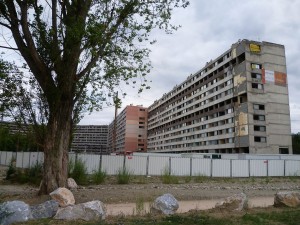 This issue of exclusion and marginalization has only been furthered by the discourses that have emerged in the wake of the attacks, with Marine Le Pen, leader of the growing right-wing fundamentalist party, the National Front, placing the blame on all of Islam.[lxiii] Even those who stand on the liberal left have engaged in this form of rhetoric, citing Islamic extremism as the enemy of the West.[lxiv] Regardless of political persuasion, it is clear that the Paris attack has provided the Western world with a clear adversary, the Middle Eastern world which stands supposedly against freedom of expression, and all other Western values.[lxv] This argument not only infantilizes an entire religion, but also posits this Western principle as a “civilizational frontier,” or mark that distinguishes progression from stagnancy and liberty from oppression. This perspective is further exemplified in the French Prime Minister, Manuel Vall’s, declaration of “a war against terrorism, against jihadism, against radical Islam, against everything that is aimed at breaking fraternity, freedom, and solidarity.”[lxvi] Moreover, Isaac Herzog, the head of Israel’s Labor Party has been citied as saying “Terrorism is terrorism. There’s no two ways about it.”[lxvii] However, despite the self-righteous fervor with which these two politicians (among many others) speak, as Noam Chomsky astutely asserts “There are definitely two ways about it: theirs versus ours.”[lxviii] In fact, the reaction of both the general public and the prominent politicians reveals striking discrepancies and contradictions in how different events are viewed and whose bodies are valued.
This issue of exclusion and marginalization has only been furthered by the discourses that have emerged in the wake of the attacks, with Marine Le Pen, leader of the growing right-wing fundamentalist party, the National Front, placing the blame on all of Islam.[lxiii] Even those who stand on the liberal left have engaged in this form of rhetoric, citing Islamic extremism as the enemy of the West.[lxiv] Regardless of political persuasion, it is clear that the Paris attack has provided the Western world with a clear adversary, the Middle Eastern world which stands supposedly against freedom of expression, and all other Western values.[lxv] This argument not only infantilizes an entire religion, but also posits this Western principle as a “civilizational frontier,” or mark that distinguishes progression from stagnancy and liberty from oppression. This perspective is further exemplified in the French Prime Minister, Manuel Vall’s, declaration of “a war against terrorism, against jihadism, against radical Islam, against everything that is aimed at breaking fraternity, freedom, and solidarity.”[lxvi] Moreover, Isaac Herzog, the head of Israel’s Labor Party has been citied as saying “Terrorism is terrorism. There’s no two ways about it.”[lxvii] However, despite the self-righteous fervor with which these two politicians (among many others) speak, as Noam Chomsky astutely asserts “There are definitely two ways about it: theirs versus ours.”[lxviii] In fact, the reaction of both the general public and the prominent politicians reveals striking discrepancies and contradictions in how different events are viewed and whose bodies are valued.
Undoubtedly, the anger and outrage invoked by this horrific attack is understandable and justified, and was likely the intention of the Kouachi brothers. In moments of terror and devastation, people come together in solidarity, and latch onto certain ideas and notions. “JeSuisCharlie” was a powerful sentiment, and gave many people a way in which to grieve and understand the attack. However, despite the honest intentions of many who subscribe to this identification, when held in staunch defiance, this sentiment has the ability to further perpetuate strict binaries of dark vs. light, good vs. evil, and us vs. them “by framing [the] events in Manichean terms.”[lxix] Through this process, the discourses surrounding the massacre become overly reductive and coarsened, and other underlying factors are overlooked. While the act in itself was abhorrent, these moments of terror require careful reflection, and we must “take care not to lace grief with hate, vengeance and more violence.”[lxx] As Joe Sacco poignantly expresses in his comic strip, “perhaps when we tire of holding up our middle finger we can try to think about why the world is the way it is” instead of appealing to over-simplified arguments that pegs Islam as the enemy of the West, which Sacco asserts is “far easier than sorting out how we fit into each other’s world.”[lxxi] In this endeavor, it is necessary to look upon the conditions that may have facilitated this act of violence, and identify which dangerous and unhealthy aspects of our own society are in need of exorcism. Unfortunately, it is all too likely that this staunch defense of republican values will morph into stringent restrictions on the personal freedoms of the French, and could serve as justification for more severe manifestations of Islamophobia throughout the Western world.
[i] Smith, C. A. (2015, January 9). Charlie Hebdo: We Must Grieve the Dead Without Misconstruing Racism as a Democratic Ideal. Truthout. Retrieved from http://www.truth-out.org/opinion/item/28452-charlie-hebdo-we-must-grieve-the- dead-without-misconstruing-racism-as-democratic-ideal
[ii] BBC. (2015, January, 2015). Paris Shootings: Francois Hollande Brands Acts ‘Barbaric’. BBC News. Retrieved from http://www.bbc.com/news/world-europe- 30713129
[iii] Cole, J. (2015, January 12). Charlie Hebdo Team Regrets Not Parading Caricatures of Hypocritical World Leaders at Paris Rally. TruthDig. Retrieved from http://www.truthdig.com/report/item/charlie_hebdo_team_regret_not_parading_c aricatures_world_leaders_20150112
[iv] Evans, B. (2015, January 16). The Eyes of the World. Truthout. Retrieved from http://www.truth-out.org/news/item/28561-the-eyes-of-the-world
[v] Evans, B. (2015, January 16). The Eyes of the World. Truthout. Retrieved from http://www.truth-out.org/news/item/28561-the-eyes-of-the-world
[vi] Makdisi, S. (2015, January 16). How ‘Je Suis Charlie’ Makes Matters Worse. Los Angeles Times. Retrieved from http://www.latimes.com/opinion/op-ed/la-oe-0118-makdisi-je-suis-charlie- makes-things-worse-20150118-story.html
[vii] Gay, R. (2015, January 12). If Je Ne Suis Pas Charlie, am I a Bad Person? Nuance Gets Lost in Groupthink. The Guardian. Retrieved from http://www.theguardian.com/commentisfree/2015/jan/12/je-ne-suis-pas-charlie- nuance-groupthink
[viii] Evans, B. (2015, January 16). The Eyes of the World. Truthout. Retrieved from http://www.truth-out.org/news/item/28561-the-eyes-of-the-world
[ix] Evans, B. (2015, January 16). The Eyes of the World. Truthout. Retrieved from http://www.truth-out.org/news/item/28561-the-eyes-of-the-world
[x] Palumbo-Liu, D. (2015, January 11). The Problem with “Je Suis Charlie”: That Kind of Solidarity Comes with Baggage. Salon Magazine. Retrieved from http://www.salon.com/2015/01/11/the_problem_with_je_suis_charlie_that_kind_of _solidarity_comes_with_baggage/
[xi] Sellar, E. (2015, January 16). Je Suis Charlie: Reflections on Charlie from a French Millennial. Elite Daily. Retrieved from http://elitedaily.com/life/je-suis-charlie- reflections-charlie-hebdo-french-millennial/908976/
[xii] MacArthur, J. R. (2015, January 15). America’s Peculiar Political Correctness. Harper’s Magazine. Retrieved from http://harpers.org/blog/2015/01/u-s- reactions-to-paris-attacks-reveal-peculiar-form-of-political-correctness/
[xiii] Murdoch, R. [RupertMurdoch]. (2015, January 9). Maybe most Moslems peaceful, but until they recognize and destroy their growing jihadist cancer they must be held responsible [Tweet]. Retrieved from https://twitter.com/rupertmurdoch/status/553734788881076225
[xiv] Younge, G. (2015, January 11). Charlie Hebdo: The Danger of a Polarized Debate. The Guardian. Retrieved from http://www.theguardian.com/commentisfree/2015/jan/11/charie-hebdo-danger- polarised-debate-paris-attacks
[xv] Praxmarer, P. (2015, January 18). Charlie Hebdo and Intercultural Dialogue. Centre for Intercultural Dialogue. Retrieved from http://centerforinterculturaldialogue.org/2015/01/18/charlie-hebdo-and- intercultural-dialogue/
[xvi] Makdisi, S. (2015, January 16). How ‘Je Suis Charlie’ Makes Matters Worse. Los Angeles Times. Retrieved from http://www.latimes.com/opinion/op-ed/la-oe-0118-makdisi-je-suis-charlie- makes-things-worse-20150118-story.html
[xvii] Sayare, S. (2015, January 11). The Charlie Hebdo I Know. The Atlantic. Retrieved from http://www.theatlantic.com/international/archive/2015/01/charlie-hebdo- secularism-religion-islam/384413/
[xviii] MacArthur, J. R. (2015, January 15). America’s Peculiar Political Correctness. Harper’s Magazine. Retrieved from http://harpers.org/blog/2015/01/u-s- reactions-to-paris-attacks-reveal-peculiar-form-of-political-correctness/
[xix] Goldhammer, A. (2015, January 8). Let’s Not Sacralize Charlie Hebdo. Aljazeera America. Retrieved from http://america.aljazeera.com/opinions/2015/1/charlie- hebdo-gouaillesatireislamjournalism.html
[xx] Goldhammer, A. (2015, January 8). Let’s Not Sacralize Charlie Hebdo. Aljazeera America. Retrieved from http://america.aljazeera.com/opinions/2015/1/charlie- hebdo-gouaillesatireislamjournalism.html
[xxi] Sayare, S. (2015, January 11). The Charlie Hebdo I Know. The Atlantic. Retrieved from http://www.theatlantic.com/international/archive/2015/01/charlie-hebdo- secularism-religion-islam/384413/
[xxii] Sayare, S. (2015, January 11). The Charlie Hebdo I Know. The Atlantic. Retrieved from http://www.theatlantic.com/international/archive/2015/01/charlie-hebdo- secularism-religion-islam/384413/
[xxiii] Madood, T. (2015, February 17). Values and Violence: Thoughts on Charlie Hebdo. The Immanent Frame. Retrieved from http://blogs.ssrc.org/tif/2015/02/17/values- and-violence-thoughts-on-charlie-hebdo/
[xxiv] Long, S. (2015, January 9). Why I am Not Charlie. A Paper Bird. Retrieved from http://paper-bird.net/2015/01/09/why-i-am-not-charlie/
[xxv] Evans, B. (2015, January 16). The Eyes of the World. Truthout. Retrieved from http://www.truth-out.org/news/item/28561-the-eyes-of-the-world
[xxvi] Evans, B. (2015, January 16). The Eyes of the World. Truthout. Retrieved from http://www.truth-out.org/news/item/28561-the-eyes-of-the-world
[xxvii] Sayare, S. (2015, January 11). The Charlie Hebdo I Know. The Atlantic. Retrieved from http://www.theatlantic.com/international/archive/2015/01/charlie-hebdo- secularism-religion-islam/384413/
[xxviii] Smith, C. A. (2015, January 9). Charlie Hebdo: We Must Grieve the Dead Without Misconstruing Racism as a Democratic Ideal. Truthout. Retrieved from http://www.truth-out.org/opinion/item/28452-charlie-hebdo-we-must-grieve-the- dead-without-misconstruing-racism-as-democratic-ideal
[xxix] Younge, G. (2015, January 11). Charlie Hebdo: The Danger of a Polarized Debate. The Guardian. Retrieved from http://www.theguardian.com/commentisfree/2015/jan/11/charie-hebdo-danger- polarised-debate-paris-attacks
[xxx] Younge, G. (2015, January 11). Charlie Hebdo: The Danger of a Polarized Debate. The Guardian. Retrieved from http://www.theguardian.com/commentisfree/2015/jan/11/charie-hebdo-danger- polarised-debate-paris-attacks
[xxxi] Democracy Now: The War and Peace Report (Producer). (2015, January 8). Scholar Tariq Ramadan, Harper’s Rick MacArthur on Charlie Hebdo Attack & How the West Treats Muslims. (Television broadcast). New York, NY: Democracy Now! Retrieved from http://www.democracynow.org/2015/1/8/scholar_tariq_ramadan_harpers_rick_m acarthur
[xxxii] Democracy Now: The War and Peace Report (Producer). (2015, January 8). Scholar Tariq Ramadan, Harper’s Rick MacArthur on Charlie Hebdo Attack & How the West Treats Muslims. (Television broadcast). New York, NY: Democracy Now! Retrieved from http://www.democracynow.org/2015/1/8/scholar_tariq_ramadan_harpers_rick_m acarthur
[xxxiii] McLaren, N. (2015, February 17). Charlie Hebdo: When Freedom of Speech Isn’t Paramount. Truthout. Retrieved from http://www.truth- out.org/opinion/item/29101-charlie-hebdo-when-freedom-of-speech-isn-t- paramount
[xxxiv] Long, S. (2015, January 9). Why I am Not Charlie. A Paper Bird. Retrieved from http://paper-bird.net/2015/01/09/why-i-am-not-charlie/
[xxxv] Evans, B. (2015, January 16). The Eyes of the World. Truthout. Retrieved from http://www.truth-out.org/news/item/28561-the-eyes-of-the-world
[xxxvi] LeVine, M. (2015, January 10). Why Charlie Hebdo Attack is Not About Islam. Aljazeera. Retrieved from http://www.aljazeera.com/indepth/opinion/2015/01/charlie-hebdo-islam- cartoon-terr-20151106726681265.html
[xxxvii] LeVine, M. (2015, January 10). Why Charlie Hebdo Attack is Not About Islam. Aljazeera. Retrieved from http://www.aljazeera.com/indepth/opinion/2015/01/charlie-hebdo-islam- cartoon-terr-20151106726681265.html
[xxxviii] LeVine, M. (2015, January 10). Why Charlie Hebdo Attack is Not About Islam. Aljazeera. Retrieved from http://www.aljazeera.com/indepth/opinion/2015/01/charlie-hebdo-islam- cartoon-terr-20151106726681265.html
[xxxix] Zeese, K. (2015, January 11). The Roots of the Charlie Hebdo Attacks: Colonialism & War. Popular Resistance. Retrieved from https://www.popularresistance.org/the- roots-of-charlie-hebdo-attacks-colonialism-war/
[xl] Grillot, S. & Des Prez, S. (2015, January 22). Idea-Vs.-Reality For African Immigrant Families in a ‘Post-Racial’ France. KGOU. Retrieved from http://kgou.org/post/idea- vs-reality-african-immigrant-families-post-racial-france
[xli] El-Sadek, L. (2015, January 15). Grieving for Multiple Reasons: Reflections on Charlie Hebdo. The Duke Chronicle. Retrieved from http://www.dukechronicle.com/articles/2015/01/15/grieving-multiple-reasons- reflections-charlie-hebdo#.VTkmqmRViko
[xlii] Grillot, S. & Des Prez, S. (2015, January 22). Idea-Vs.-Reality For African Immigrant Families in a ‘Post-Racial’ France. KGOU. Retrieved from http://kgou.org/post/idea- vs-reality-african-immigrant-families-post-racial-france
[xliii] Grillot, S. & Des Prez, S. (2015, January 22). Idea-Vs.-Reality For African Immigrant Families in a ‘Post-Racial’ France. KGOU. Retrieved from http://kgou.org/post/idea- vs-reality-african-immigrant-families-post-racial-france
[xliv] The Maroon Colony. (2015, January 13). A Confederacy of Colorblinds: Charlie Hebdo and French Racism. Retrieved from http://themarooncolony.com/2015/01/13/a-confederacy-of-colorblinds-charlie- hebdo-and-french-racism/
[xlv] Grillot, S. & Des Prez, S. (2015, January 22). Idea-Vs.-Reality For African Immigrant Families in a ‘Post-Racial’ France. KGOU. Retrieved from http://kgou.org/post/idea- vs-reality-african-immigrant-families-post-racial-france
[xlvi] Shani, G. (2015, January 29). La Haine. Laicite, Charlie Hebdo and the Republican War on Religion. E-International Relations. Retrieved from http://www.e- ir.info/2015/01/29/la-haine-laicite-charlie-hebdo-and-the-republican-war-on- religion/
[xlvii] Sayare, S. (2015, January 30). What Je Suis Charlie Has Become. The Atlantic. Retrieved from http://www.theatlantic.com/international/archive/2015/01/je-suis-charlie- france-patriotism/384990/
[xlviii] Sayare, S. (2015, January 30). What Je Suis Charlie Has Become. The Atlantic. Retrieved from http://www.theatlantic.com/international/archive/2015/01/je-suis-charlie- france-patriotism/384990/
[xlix] Sayare, S. (2015, January 30). What Je Suis Charlie Has Become. The Atlantic. Retrieved from http://www.theatlantic.com/international/archive/2015/01/je-suis-charlie- france-patriotism/384990/
[l] Sayare, S. (2015, January 30). What Je Suis Charlie Has Become. The Atlantic. Retrieved from http://www.theatlantic.com/international/archive/2015/01/je-suis-charlie- france-patriotism/384990/
[li] The Maroon Colony. (2015, January 13). A Confederacy of Colorblinds: Charlie Hebdo and French Racism. Retrieved from http://themarooncolony.com/2015/01/13/a-confederacy-of-colorblinds-charlie- hebdo-and-french-racism/
[lii] Grillot, S. & Des Prez, S. (2015, January 22). Idea-Vs.-Reality For African Immigrant Families in a ‘Post-Racial’ France. KGOU. Retrieved from http://kgou.org/post/idea- vs-reality-african-immigrant-families-post-racial-france
[liii] European Network Against Racism (2013). Racism and Discrimination in Employment in Europe. Brussels: European Network Against Racism. Retrieved from http://cms.horus.be/files/99935/MediaArchive/publications/shadow%20report% 202012-13/shadowReport_final.pdf
[liv] Grillot, S. & Des Prez, S. (2015, January 22). Idea-Vs.-Reality For African Immigrant Families in a ‘Post-Racial’ France. KGOU. Retrieved from http://kgou.org/post/idea- vs-reality-african-immigrant-families-post-racial-france
[lv] Hedges, C. (2015, January 11). A Message from the Dispossessed. Truthdig. Retrieved from http://www.truthdig.com/report/item/a_message_from_the_dispossessed_201501 11
[lvi] El-Sadek, L. (2015, January 15). Grieving for Multiple Reasons: Reflections on Charlie Hebdo. The Duke Chronicle. Retrieved from http://www.dukechronicle.com/articles/2015/01/15/grieving-multiple-reasons- reflections-charlie-hebdo#.VTkmqmRViko
[lvii] Hedges, C. (2015, January 11). A Message from the Dispossessed. Truthdig. Retrieved from http://www.truthdig.com/report/item/a_message_from_the_dispossessed_201501 11
[lviii] Hedges, C. (2015, January 11). A Message from the Dispossessed. Truthdig. Retrieved from http://www.truthdig.com/report/item/a_message_from_the_dispossessed_201501 11
[lix] Democracy Now: The War and Peace Report (Producer). (2015, January 8). Scholar Tariq Ramadan, Harper’s Rick MacArthur on Charlie Hebdo Attack & How the West Treats Muslims. (Television broadcast). New York, NY: Democracy Now! Retrieved from http://www.democracynow.org/2015/1/8/scholar_tariq_ramadan_harpers_rick_m acarthur
[lx] The Maroon Colony. (2015, January 13). A Confederacy of Colorblinds: Charlie Hebdo and French Racism. Retrieved from http://themarooncolony.com/2015/01/13/a-confederacy-of-colorblinds-charlie- hebdo-and-french-racism/
[lxi] Sayare, S. (2015, January 30). What Je Suis Charlie Has Become. The Atlantic. Retrieved from http://www.theatlantic.com/international/archive/2015/01/je-suis-charlie- france-patriotism/384990/
[lxii] Sayare, S. (2015, January 30). What Je Suis Charlie Has Become. The Atlantic. Retrieved from http://www.theatlantic.com/international/archive/2015/01/je-suis-charlie- france-patriotism/384990/
[lxiii] Smith, C. A. (2015, January 9). Charlie Hebdo: We Must Grieve the Dead Without Misconstruing Racism as a Democratic Ideal. Truthout. Retrieved from http://www.truth-out.org/opinion/item/28452-charlie-hebdo-we-must-grieve-the- dead-without-misconstruing-racism-as-democratic-ideal
[lxiv] Younge, G. (2015, January 11). Charlie Hebdo: The Danger of a Polarized Debate. The Guardian. Retrieved from http://www.theguardian.com/commentisfree/2015/jan/11/charie-hebdo-danger- polarised-debate-paris-attacks
[lxv] Younge, G. (2015, January 11). Charlie Hebdo: The Danger of a Polarized Debate. The Guardian. Retrieved from http://www.theguardian.com/commentisfree/2015/jan/11/charie-hebdo-danger- polarised-debate-paris-attacks
[lxvi] Chomsky, N. (2015, January 20). Paris Attacks Show Hypocrisy of West’s Outrage. CNN. Retrieved from http://www.cnn.com/2015/01/19/opinion/charlie-hebdo- noam-chomsky/
[lxvii] Chomsky, N. (2015, January 20). Paris Attacks Show Hypocrisy of West’s Outrage. CNN. Retrieved from http://www.cnn.com/2015/01/19/opinion/charlie-hebdo- noam-chomsky/
[lxviii] Chomsky, N. (2015, January 20). Paris Attacks Show Hypocrisy of West’s Outrage. CNN. Retrieved from http://www.cnn.com/2015/01/19/opinion/charlie-hebdo- noam-chomsky/
[lxix] Younge, G. (2015, January 11). Charlie Hebdo: The Danger of a Polarized Debate. The Guardian. Retrieved from http://www.theguardian.com/commentisfree/2015/jan/11/charie-hebdo-danger- polarised-debate-paris-attacks
[lxx] Smith, C. A. (2015, January 9). Charlie Hebdo: We Must Grieve the Dead Without Misconstruing Racism as a Democratic Ideal. Truthout. Retrieved from http://www.truth-out.org/opinion/item/28452-charlie-hebdo-we-must-grieve-the- dead-without-misconstruing-racism-as-democratic-ideal
[lxxi] Sacco, J. (2015, January 9). On Satire – a Response to the Charie Hebdo Attacks. The Guardian. Retrieved from http://www.theguardian.com/world/ng- interactive/2015/jan/09/joe-sacco-on-satire-a-response-to-the-attacks
Related News
News Listing
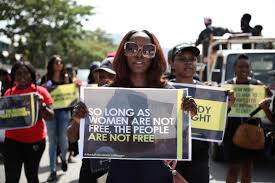
By Rosemary Kasiobi Nwadike ➚
Feminist Miseducation in the Afro-West: Examining (In)Formal Gender Indoctrinations
Articles, Education, Resistance, Social Justice
July 11, 2025

By Jovana Paramentic ➚
Commodifying Mental Health: Online Therapy Platforms Operating Within a Neoliberal Framework
Articles, Social Justice
June 25, 2025
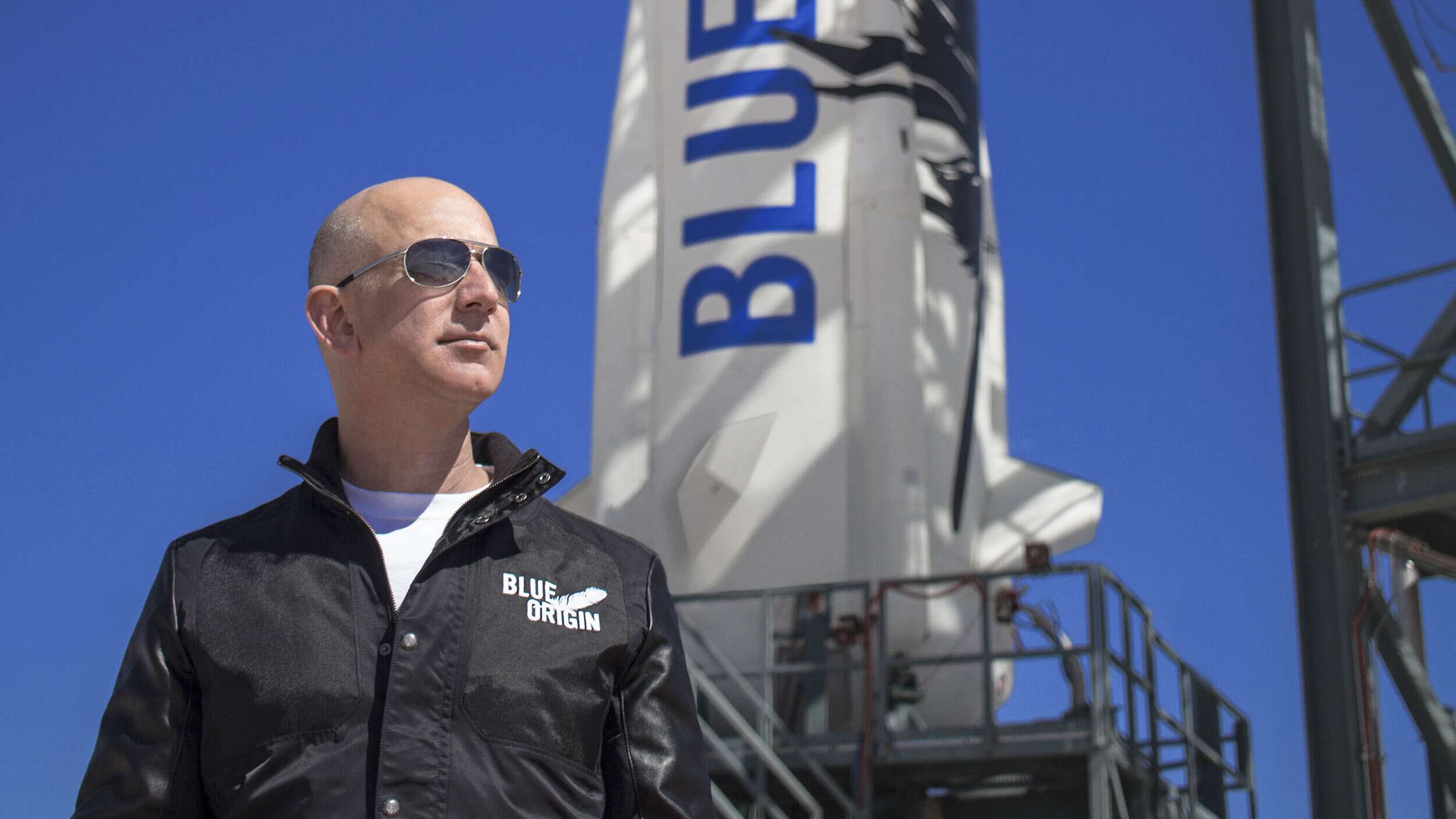
By Malaika Mitra ➚
The Ungrounding of Humanity: Sustainable Energy Discourses and the Plunder of the Earth
Articles, Social Justice
May 10, 2025
